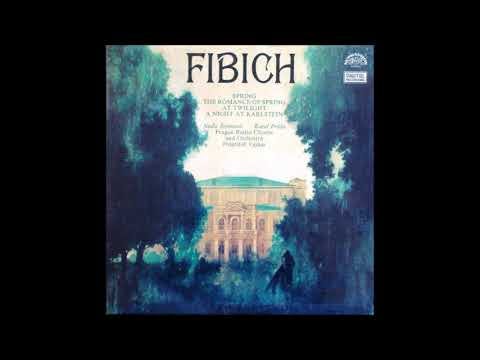There are many happy results of the West’s obsession with categorizing works of art, not least that it allows us to write coherent histories of what begot what and why. But one unhappy result is that the great artists who don’t fit into the neat categories we construct tend to be forgotten, because they find no role in the resulting history. Today’s recordings are of one such composer: the late nineteenth century (conveniently, he lived from 1850 to 1900) Czech composer Zdeněk Fibich.
In the dominant music history narrative, the Austro-German tradition suffered from a revolt of the periphery in the late 19th century. Composers from the outer lying parts of Europe (e.g., Dvořák in Czech Austria-Hungary and Grieg in Norway) suddenly discovered that they no longer needed to prostrate at the feet of Beethoven, Brahms, and Wagner—that their native traditions were worth something after all. This revolt—dramatized in Dvořák’s foot-stomping Slavonic Dances, Grieg’s folksy Slåtter or Smetana’s aching Vltava (The Moldeau)—helped create the crisis in German Romantic dominance that gave us 20th century modernism.
Of course, reality is more complicated. Dvořák, Smetana, and Grieg still owe a great debt to German romanticism, particularly to Wagner (try to imagine Rusalka being written if Wagner had never lived!). But the fact remains that those composers openly embraced musical nationalism while many of their countrymen chose to remain planted in the Austro-German tradition. And that, despite the considerable talents of composers like Johan Svendsen or Fibich, is why we don’t know their names but we know those of Smetana and Grieg.
I present to you two pieces that might convince you that Fibich’s name ought to be better known. At the very least, he will give you some of the most pleasant afternoon listening of your summer.
The first work on our program is his First Symphony, written in his late 20s, which shows its composer to be a master both of tone painting and dramatic arc. There are days on which it’s my favorite pastoral symphony, even surpassing Beethoven’s. A devotee of Wagnerian music drama (Fibich was a prolific opera composer and dramaturg), he alludes in the symphony’s first movement to the “Forest Murmurs” section of Siegfried, premiered only a few years before he wrote the symphony. But, he uses this Wagnerian palate as a jumping-off point to create a work of melodic memorability and forward drive. His first theme has all the majesty of an open pastureland in midsummer, and his sequence of secondary themes (from 2:00-3:30) the mystery of a shaded forest cave. The remaining movements show mastery in a variety of styles (alternating a traditional scherzo with a polka in the second movement), ending with a rollicking sleigh ride whose coda (33:40) creatively tips its hat to Schumann’s Fourth.
Our second work is late Fibich, and shows his facility in the freer-form symphonic poem genre. At Twilight is a fantasia on Fibich’s best-known melody (first revealed in full at 6:38). The melody is taken from a musical diary of Fibich’s extramarital affair with a female piano student named Anežka Schulzová. This prolific diary, published posthumously in an annotated edition as Zdeněk Fibich's Erotic Diary, provided material for this piece and a set of 376 short piano pieces called the Moods, Impressions, and Souvenirs, among others. In At Twilight, you will hear Fibich build the melody from the ground up over the first five minutes of the piece and then develop it through a series of chromatically rich variations featuring different sections of the orchestra. At 13:00, you will even hear it as a soft brass chorale with string pizzicato walking bass, in a remarkably similar treatment to the end of the first movement of Tchaikovsky’s Pathetique Symphony, written the very same year (1893).
After listening, maybe you’ll even open an erotic diary with your lover or spouse, knowing that it might yield something this good.
DB




The elegance, liveliness, and beauty of your writing never fails to astonish me, Don Baton. I'm going to listen to these works right now. I'd never heard of Zdeněk Fibich until now, as far as I can recall. What a treasure trove of inspiration your newsletter is!